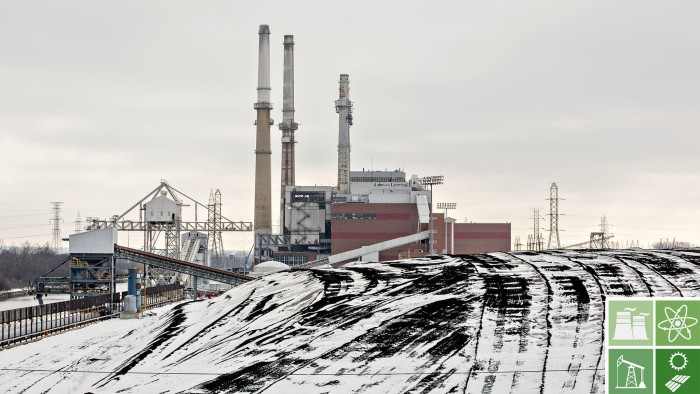Carbon pricing proposals tax US politicians and theorists

Roula Khalaf, Editor of the FT, selects her favourite stories in this weekly newsletter.
Carlos Curbelo proposed legislation in the US Congress earlier this month to address the threat of climate change.
The Republican member of the House of Representatives launched a bill calling for a new emissions tax at a rate of $24 per tonne of carbon dioxide, rising 2 per cent above inflation each year, levied on coal mines, refineries, gas processing plants, and some industrial production and import facilities.
The money would be used to abolish the federal tax on petrol, unchanged since 1993 at 18.4 cents per US gallon, and provide a revenue stream for investing in roads and bridges, with smaller amounts for grants to low-income households, flood protection and research into energy innovation.
The congressman, with a district at the southern tip of Florida, described his plan as a “big, sober solution to address some of our country’s greatest challenges” including the need to repair and modernise roads, bridges and airports.
His proposal, though, stands no immediate chance of becoming law.
An opposing resolution in the House the same week argued that “a carbon tax would be detrimental to American families and businesses, and is not in the best interest of the United States”. The “sense of the Congress” resolution was passed in the House by 229 votes to 180. Only six Republican members, including Mr Curbelo, voted against it, while seven Democrats voted for it.
Despite hostility to Mr Curbelo’s bill, his initiative has shown that though support for carbon pricing on the right of US politics is weak, it has not been completely extinguished.
Former US president George W Bush spoke in 2008 in favour of a “carbon-weighted” incentive that would “make lower emission power sources less expensive relative to higher emissions sources”.
Last year Republican grandees George Shultz and James Baker, who served respectively as secretaries of state for presidents Ronald Reagan and George HW Bush, launched a plan for a revenue-neutral carbon tax that would be returned to citizens as dividend payments to boost their incomes.
Their argument follows logic derived from Adam Smith that is widely accepted by economists. The emissions from burning fossil fuels represent an external cost that is not borne by consumers, with the result that “Adam Smith’s invisible hand will fail to lead to an efficient outcome”, according to Greg Mankiw, writing in a paper for the Eastern Economic Journal nearly a decade ago. The former chairman of George W Bush’s Council of Economic Advisers then argued the “simple way to remedy the market failure” was to charge individuals “for the external costs they impose on others”.
Many environmental campaigners argue that, if consumers are allowed to create greenhouse gas emissions that impose costs on others without paying any compensation, they are effectively being subsidised in part to use such fuels.
The argument over what is and is not a subsidy gets philosophical pretty quickly. Is a tax break on capital spending for oil producers also a subsidy, if it is also available to manufacturers? Does the cost of keeping a US navy fleet stationed off the Arabian peninsula to guarantee security of supply count as a subsidy for oil producers and consumers? It is easy to see how opposing sides in the energy debate can come up with very different numbers.
Even if you accept the principle that unpriced carbon emissions amount to an effective subsidy, there is still room for disagreement over how large that subsidy is. The long-running debate in the US over the social cost of carbon — the contribution of a single tonne of emissions to the harm caused by climate change — gives an insight into how widely estimates can vary.
Estimates over the scale of explicit and implied subsidy on carbon-based energy supply worldwide vary widely among economists.
The International Energy Agency calculated that global subsidies for the consumption of fossil fuels were worth $260bn in 2016. That was the lowest level in at least a decade, but still significantly more than the $140bn value of subsidies for renewable energy in power generation.
Based on broader definitions, the estimated effective subsidies for fossil fuels worldwide (including the unpriced costs of emissions) were worth $5.3tn in 2015, or about 6.5 per cent of global gross domestic product, economists calculated in a paper produced for the IMF.
A carbon tax might be, in the words of Mr Mankiw more than a decade ago, “the most direct and least invasive policy to address environmental concerns”. But for as long as one does not exist, supporters of other climate policies can argue that the deck is stacked in favour of fossil fuels, and that something should be done to redress the balance.

Explore the rest of our stories on Citizens and Consumers
- Indonesia sticks with coal to meet energy demand
- Mexico City seeks fix for transport pollution
- Pakistan pivots to coal to close energy gap
- China pollution obsession spawns global industry
- Environmentalists split on clean energy transition
- FT readers say carbon pricing key to energy debate
- Energy, emissions and personal responsibility

Comments